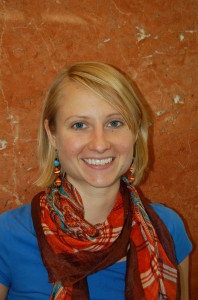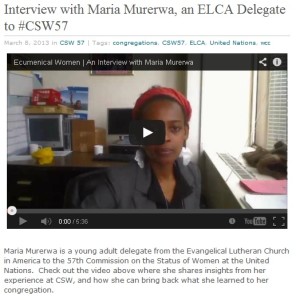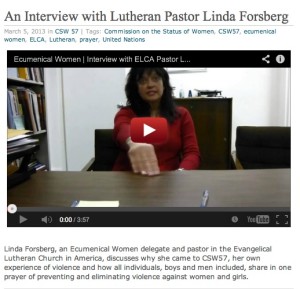
Sarah Dreier
By Sarah Dreier, Legislative Representative of International Policy for the ELCA and The Episcopal Church
The discipline of yoga has taught me to realize that I am whole in God, regardless of what goes on around me — that no experiences I encounter in my worldly life will adulterate that godly wholeness. Drawing on this notion of spiritual wholeness, I have developed and redefined what it means to be excellent in my work as the legislative representative of international policy for the ELCA and the Episcopal Church, even as I tackle worldly injustices that seem utterly impassable.
Every day, I work with Congress and the Administration to challenge them to address and abate global injustices, including hunger, malnutrition, lack of development, violence and other human rights violations. I advocate for U.S. policies that will help eradicate extreme poverty, increase child and maternal nutrition, combat HIV and AIDS, address the atrocities of human trafficking, and hold multinational corporations accountable to the taxes they are so adept at evading. I urge Congress to pass an annual federal budget that is consistent with our church’s commitments to address poverty and support those who are most vulnerable in the United States and around the world.
And I am not alone. I work with a network of professionals in Washington, D.C., and New York — and with engaged Lutherans and Episcopalians all over the country — who are committed to speaking reason to partisanship, justice to power, generosity to profane greed; to confronting poverty, racism, sexism, violence, climate change and all other forces that subjugate rather than emancipate God’s people.
Even working together, these enormous objectives seem insurmountable, impassable.
But this should not intimidate us to respond to worldly impasses by surrendering or lowering our standards of success. Instead, through, with and for God, we may be driven by a different kind of excellence — a spiritual excellence that enables us to overcome even the most challenging worldly impasses.
What does it mean to be excellent servants of God as we face and try to overcome these worldly impasses? Surely, we must not misinterpret Jesus’ warning that the poor will always be among us (John 12:8) as permission to surrender to these impasses of injustice. We are instead commanded to open our hands to the poor and needy in our land (Deuteronomy 15:11).
Two principles have guided my own understanding of excellence, within these worldly constraints:
First, take a leap of faith, and trust that God is working through us to overcome the impassable.
Last week, I heard a representative from the President’s Emergency Plan for AIDS Relief ruminate on the global fight against AIDS in the last few decades — how unbeatable the pandemic seemed at so many critical junctures, and yet the unthinkable progress that our world has seen in the fight against HIV and AIDS. Today, scientists and politicians agree that if countries and international actors maintain a strong commitment to treating and preventing HIV and AIDS, the end of the pandemic is within our reach. Talk about surmounting impasses!
This is just one example, and we have seen, time and again — around the world — that through God, nothing is insurmountable.
Second, redefine excellence, oriented not only toward large accomplishments or measurable changes, but focused instead on the “least of these” — the poor, vulnerable, excluded and weary among us.
When we redefine our own excellence in terms of our service to “the least of these” (Matthew 25:40) — the poor and weary among us — we begin to recognize the unseen vulnerable whose lives are better because we engage them and work with them to lighten their burden (even when we do not overcome the big-picture obstacles), or the contributions that our diverse body of Christ are making to a public dialogue and an evolving public ethic.
We in the church are counter-cultural, tasked to uplift an ethic that prioritizes and exults the “least of these” in a Wall Street, partisan, radically individualistic world. When we remember that we are made in the image of God, this spiritual wholeness frees us from being restricted to worldly impasses. We are freed to reorient our notion of ethics toward those whom society has cast aside. And this leap of faith and redefining of excellence — I believe this is what makes us truly excellent in the eyes of God.





 enth Commission on the Status of Women with an ecumenical group of colleagues from other advocacy offices and even met two Nobel Peace Prize laureates. Through such experiences however, I’ve been burdened with one central question, “How can ELCA members throughout the country participate in the global conversation I experience everyday in New York?”
enth Commission on the Status of Women with an ecumenical group of colleagues from other advocacy offices and even met two Nobel Peace Prize laureates. Through such experiences however, I’ve been burdened with one central question, “How can ELCA members throughout the country participate in the global conversation I experience everyday in New York?”